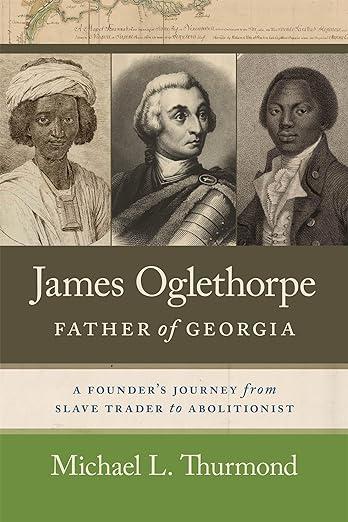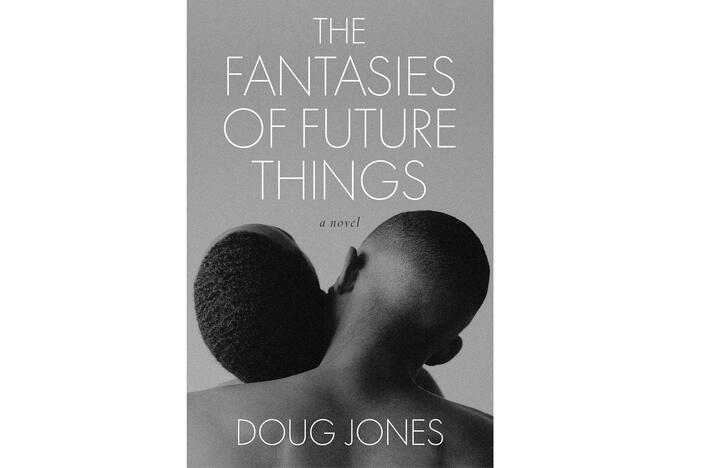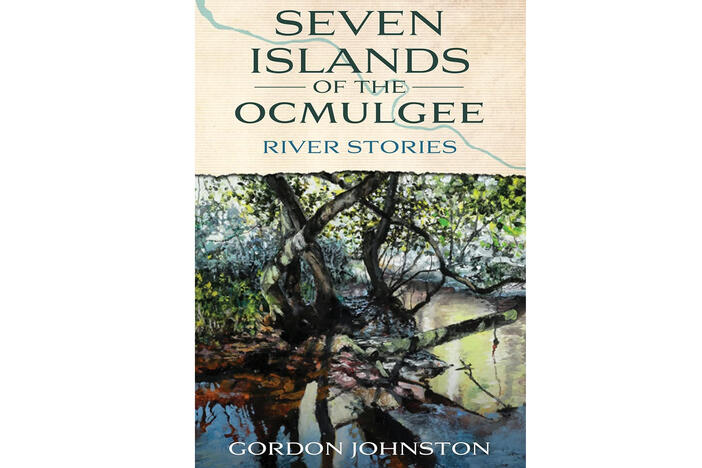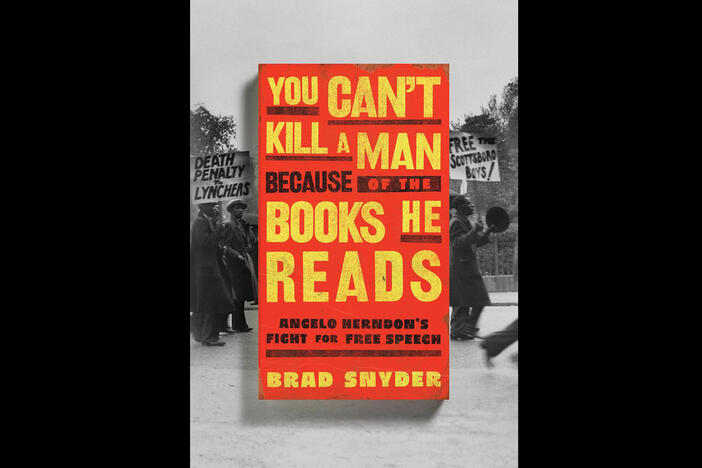
Section Branding
Header Content
Michael Thurmond's James Oglethorpe, Father of Georgia: A Founder’s Journey from Slave Trader to Abolitionist
Primary Content
Utilizing more than two decades of meticulous research, fresh historical analysis, and compelling storytelling, Michael L. Thurmond rewrites the prehistory of abolitionism and adds an important new chapter to Georgia’s origin story. Can he change the hearts and minds of those who were taught Georgia history years ago? Can he change the hearts and minds of our hosts, Peter and Orlando? Listen and judge for yourself.

Peter Biello: Coming up in this episode.
Michael Thurmond: And there is a large white marble plaque. And it simply stated he was the friend of the oppressed Negro.
Orlando Montoya: And that inscription started a nearly three decade long journey of discovery for Thurmond. And it led to this book.
Peter Biello: This podcast from Georgia Public Broadcasting highlights books with Georgia Connections, hosted by two of your favorite public radio book nerds, who also happen to be your hosts of All Things Considered on GPB radio. I'm Peter Biello.
Orlando Montoya: And I'm Orlando Montoya. Thanks for joining us as we introduce you to authors, their writings, and the insights behind their stories, mixed with our own thoughts and ideas on just what gives these works the Narrative Edge.
Peter Biello: All right. We are back with another episode. Orlando, what do you have today?
Orlando Montoya: Well, first of all, I've got a quick three question Georgia history quiz.
Peter Biello: I'm going to fail this quiz.
Orlando Montoya: Who was Georgia named for?
Peter Biello: King George?
Orlando Montoya: Yeah. That's right.
Peter Biello: Okay.
Orlando Montoya: KingGeorge II. What was Georgia's capital city during the Civil War?
Peter Biello: Was this Savannah?
Orlando Montoya: No, no, Milledgeville.
Peter Biello: I would not have known that.
Orlando Montoya: And who was Georgia's founder?
Peter Biello: Ray Charles.
Orlando Montoya: He is the subject of today's book. That's what we're talking about today. General James Oglethorpe, the founder of Georgia. He is the subject of a new book. And this book sort of changes our understanding of the man. It's written by the CEO of DeKalb County, former Georgia Labor commissioner, historian and author, a history maker himself, Michael Thurmond.
Peter Biello: And so how does this change our understanding of this guy?
Orlando Montoya: Well, let's start by talking about two men, the founder and the author. And I think I'll start about talking about the author, Michael Thurmond, because I think Thurmond really is the only person that could have written this book about Georgia's founder. Thurmond, like I said, he's a history maker. He was the first black person elected to statewide office in Georgia without having been appointed to the position first. He's a fixture in Georgia politics for coming on three decades and back in 1996, when he was an agency head in Georgia, he was part of a delegation of Georgia dignitaries that went to England. He was the only black person in the delegation, and as part of this trip, they went to Oglethorpe's final resting place in England. And here's what Michael Thurmond saw.
Michael Thurmond: General Oglethorpe and his wife Elizabeth entombed beneath the floor of the Parish Church of All Saints, in the village of Cranham, about 19 miles northeast of London. And there is a large white marble plaque. And it simply stated he was the friend of the oppressed Negro.
Orlando Montoya: And that inscription started a nearly three decade long journey of discovery for Thurmond. And it led to this book because the prevailing narrative about Oglethorpe was that he was not a friend of the Negro.
Peter Biello: Tell us more about that prevailing narrative.
Orlando Montoya: So to get into my former role as a tour guide in Savannah, Georgia, for a minute, I used to be a tour guide for many years to to talk about Oglethorpe very briefly. He came to the New World to found a colony for poor white people in England. He wanted to get people out of the jails, out of the debtor's prisons. He wanted to bring them here, and he banned slavery here. And the the prevailing narrative was that he did not ban slavery out of some sort of moral reason. He banned slavery because he thought it would be bad for the white citizens here. He also thought that this would be a security risk to have a lot of enslaved people here. He thought it might benefit the Spanish, and he knew that to have enslaved people, you'd have a plantation class, you'd have a rich upper class. And he didn't want that. So that's the prevailing view of why he didn't want enslaved people in the Georgia colony. And I cannot tell you how deeply ingrained that narrative is in Savannah. As you know, it's a big tourist economy. People go there to learn about Oglethorpe. And Thurmond saw this inscription and he didn't believe it.
Michael Thurmond: Basically rejected it. So what I committed myself to do was to follow the facts. I did not know 80% of the information that I ultimately was able to glean and research and write about. So that was not my intent to revise his reputation. My intent was to conduct, as best I can, objective research and analysis and to conclude or come to some conclusion about whether or not the statement was true. As I continued my research, I found some very critical archival documents that continue to lead me. And that's why I think it took the period that it took. But it was only after the facts led me in the direction that I come to came to the conclusion that Oglethorpe was, in fact, among the first white men in North America to oppose chattel slavery.
Peter Biello: Okay, so what did Thurmond find that changed him from skeptic to believer?
Orlando Montoya: What I like about this book, Peter, is that there's an arc in it, and there's lots of different things that he finds. I mean, he starts out his life as indifferent to the plight of enslaved Africans. Then he becomes anti-slavery. That is how we see him when he founded the Georgia colony. He he doesn't want it there, but he's not opposed to it in general.
Peter Biello: Not opposed to slavery in general.
Orlando Montoya: Yes. So then he goes from that to being a zealous abolitionist. And that transformation, started in this Thurmond narrative around 1732, so shortly before he founded the Georgia Colony, when he came into the possession of a letter from an enslaved man. Because, get this, he was the deputy general of the Royal African Company.
Peter Biello: Oh, okay.
Orlando Montoya: So Oglethorpe is the deputy general of a slave trading company, and that's how he ends up in possession of this letter.
Michael Thurmond: The first formerly enslaved black man that came into Oglethorpe life was, Yabu Sulayman Diallo, who was a young African Muslim, captured, enslaved, transported to, the Maryland colony. Diallo was educated, came from a wealthy family in what is now modern day Senegal. After a failed escape attempt from a tobacco plantation, Diallo's enslaver allowed him to write a letter. The letter is written in Arabic in the most improbable set of circumstances. Number one, the slave allowed him to write the letter, but number two, it traveled 4000 miles, passed through the hands of several white, enslavers who worked for the Royal African Company and ultimately fell into possession of James Oglethorpe. Oglethorpe sent the letter to Oxford University, had them interpret it. He was so affected by the contents of the letter that he arranged for Diallo's freedom. Passage from Maryland to England, where he was ultimately manumitted and set free. After Oglethorpe read the letter, that talked about, number one, his, piety, towards the religion of Islam, love for his family and the fact that he was literate is what triggered Oglethorpe's journey from slave trader to abolitionist.
Orlando Montoya: So that's just one of the, the things that sort of starts Oglethorpe's journey down the road to, being anti-slavery and then an abolitionist. This is about the time when, as I said, he founds the Georgia colony in 1733. And Oglethorpe is eventually forced out of Georgia by pro-slavery malcontents.
Peter Biello: And does being forced out of Georgia by those pro-slavery malcontents push him further into the anti-slavery camp? I imagine it would.
Orlando Montoya: He never forgave them. So there's all these malcontents in Georgia. They they they know they're not making money, by enslaving and torture and all that, of slavery. So they basically force him out. I'm not going to get into the details, but they engineer him to go back to England. Olgethorpe's life carries on in England. He returns to military service. He fights in a war. He returns to his homestead, and he sort of becomes an elder statesman in English politics. He follows developments in Georgia, namely the rise of the plantation class and chattel slavery, and he surrounds himself with England's leading abolitionists at the time. And he mentored emerging abolitionists, people whose names are unknown to me and probably to you. But it's really fascinating to get into all this sort of unknown anti-slavery movement in England. And he also meets, another formerly enslaved man named Equiano.
Peter Biello: Who was Equiano?
Orlando Montoya: Equiano was a kidnaped, enslaved African, but he was owned by a charitable, humane slave owner who allowed Equiano to purchase his freedom. Equiano eventually ended up being a sailor on merchant ships going all around the world. He ended up in Georgia, and he described all of these things in a in a book that became very famous at the time in England. And I want to leave you with one quote from that book when he describes Georgia. Equiano says of his final days in Georgia. I thus took final leave of Georgia for the treatment I had received, and it disgusted me very much against the place.
Peter Biello: So Oglethorpe befriended, some not one, but two formerly enslaved Africans. This must have further radicalized him.
Orlando Montoya: That's certainly true. As a point. One point that Thurmond makes, though, is, you know, what makes a radical.
Peter Biello: Yeah. Everything's relative, I guess, because.
Orlando Montoya: I think about the time period we're talking about. He died nearly five decades before England abolished slavery, and nearly eight decades before the US abolished slavery. So words that were used like anti-slavery, abolition, radical. It's all in context. Thurmond is arguing here that he was very, very early in this movement.
Michael Thurmond: We often use the word anti-slavery and abolitionism interchangeably, but in fact, they're very two separate philosophies and positions. A person could be anti-slavery and not support abolition. So anti-slavery was a precursor to the abolitionist movement. When Oglethorpe founded Georgia, he was not an abolitionist, but he was very anti-slavery, a slave free Georgia was an anti-slavery strategy. You say Oh, why is that important? There's this other person that we know in our history of some fame who was known as the Great Emancipator.
Orlando Montoya: Abraham Lincoln.
Michael Thurmond: Abraham Lincoln was anti-slavery before he became an abolitionist. Lincoln supported freeing his slaves, but then have them removed from the United States to either South America or Africa. He was an anti-slavery advocate before he became an abolitionist.
Peter Biello: Okay, so that kind of makes sense. I mean, we know that that in some points during the Civil War, Lincoln would have kept slavery in place despite his misgivings about it, if it would have kept the Union. But let's just pause for a moment and note here that he is, comparing Oglethorpe to Lincoln.
Orlando Montoya: Yes. This was very surprising to me as well. And I sort of, pushed Thurmond on that. But Thurmond is very committed to this idea that that that Oglethorpe was among the first white men in North America standing against chattel slavery. And let's not forget, the fact is there that Georgia was the only one of the 13 original colonies that eventually became the U.S. that was founded as anti slavery. And it all happened because of a complicated, fascinating man, our Georgia founder, James Oglethorpe.
Michael Thurmond: As Georgians, I believe we have much to be proud of. I believe that Oglethorpe legacy, is something that should be not just celebrated, but emulated. The fact that he could, bridge the gaps, between race and color and religion. So we have much to be proud of. I think the original vision of Georgia should be our North Star. And if we can, learn from Oglethorpe journey that you can change yourself. And if you can change and evolve and improve yourself, that will leverage and put you in a position where you can evolve and in truth, improve all of mankind. Oglethorpe changed the world because he was able to change himself.
Peter Biello: Did he change the world, though? I mean, it seems like Georgia pretty quickly said, no, none of this antislavery stuff.
Orlando Montoya: Like I said, there's a lot of superlative language that Thurmond uses. What I would say to that is that this certainly adds to the dialog.
Peter Biello: Yeah. Okay. That that is an even handed way of putting it. Not to say that he's he's wrong. And, you know, his assessment of that question that you ask at the beginning, right. Like, is he a friend of the Negro? It's seems like, okay, I could be convinced that he was like, for his time. You know, he was fairly, progressive. But his impact, I don't know.
Orlando Montoya: Well.
Peter Biello: Our our differences of interpretation aside, I haven't even read the book. I should I should reiterate what gives this book the Narrative Edge in your view?
Orlando Montoya: I mean, there was so much that I didn't know, he explained, sort of the context of the English abolition movement. And it like I said, it follows an arc and asks the question, how can we change? And should we reconsider James Oglethorpe?
Peter Biello: And how do you think this book is going to be received in Savannah in particular? You get the pulse on that city.
Orlando Montoya: Well, I hope it changes the narrative. You know, I do think some people are going to be reticent to change their net or their narrative. But I'm convinced not necessarily, that Oglethorpe is a Lincoln type figure, but certainly that we don't need to be dismissing or downplaying why he banned slavery in the Georgia colony. He did it. He should be celebrated for it.
Peter Biello: All right, so the book isJames Oglethorpe, Father of Georgia: A Founder’s Journey from Slave Trader to Abolitionist by Michael Thurmond. Orlando, thank you so much for telling me about it.
Orlando Montoya: And now you know more about Georgia history.
Peter Biello: Now I can pass that quiz.
Orlando Montoya: Thanks for listening to Narrative Edge. We'll be back in two weeks with a brand-new episode. This podcast is a production of Georgia Public Broadcasting. Find us online at GPB.org/NarrativeEdge.
Peter Biello: You can also catch us on the daily GPB News podcast Georgia Today for a concise update on the latest news in Georgia. For more on that and all of our podcasts, go to GPB.org/Podcasts.
Utilizing more than two decades of meticulous research, fresh historical analysis, and compelling storytelling, Michael L. Thurmond rewrites the prehistory of abolitionism and adds an important new chapter to Georgia’s origin story. Can he change the hearts and minds of those who were taught Georgia history years ago? Can he change the hearts and minds of our hosts, Peter and Orlando? Listen and judge for yourself.







